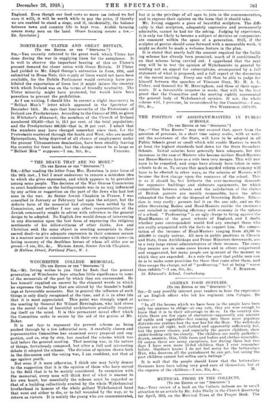WINCHESTER COLLEGE MEMORIAL.
[To THE EDITOR Or THE "SPECTATOR."]
SIR,—Mr. Irving writes to you that he finds that the present generation of Winchester boys attaches little significance to some of the memorials of the past by which they are surrounded. He has himself supplied an answer by the eloquent words in which lie expresses the feelings that are stirred by the founder's build- ings at favourable moments. But in general the influence of such things is only dimly recognized at the time, and it is in after life that it is most appreciated. This point was strongly urged at the meeting by General Sir Wilmot Herringham, who laid stress on the moral value of beautiful architecture gradually impress- ing itself on the mind. It is this permanent moral effect which the Committee seeks to secure by the aid of the genius of Mr. Baker.
It is not fair to represent the present scheme as being pushed through by a few influential men. A carefully chosen and representative Committee has examined every proposal and sug- gestion, and so, step by step, has reached the scheme which was laid before the general meeting. That meeting was, in the nature of things, fortuitously composed, but after a full and interesting debate it adopted the scheme. The division of opinion shown both in the discussion and the voting was, I am confident, not that of age against youth.
But even if it were otherwise, I think one may fairly demur to the suggestion that it is the opinion of those who have served in the field that is to be mainly considered. In connexion with the memorial, every man will think first of what is nearest to his own heart, but essentially the scheme must be regarded as that of a building collectively erected by the whole Wykehamical brotherhood in honour of the whole gallant Wykehamical band that went out either to die, or to fall wounded by the way, or to Seturn as victors. It is mainly the young who are commemorated, but it is the privilege of all ages to join in the commemoration, and to express their opinion on the form that it should take.
Mr. Irving suggests a piece of beautiful sculpture. The diffi- culty is that sculpture, adequately expressive and permanently admirable, cannot be had for the asking. Judging by experience, it is only too likely to become a subject of derisive or compassion- ate comment within the space of a generation. Still, if the sculptor of genius should come forward with a memorable work, it might no doubt be made a welcome feature in the plan.
It is stated that nearly half the amount required for the build- ing scheme has already been promised, much of it conditionally on that scheme being carried out. I apprehend that the next step will be to test the opinion of Wykehamists in general by sending out an appeal for subscriptions, accompanied by a full statement of what is proposed, and a full report of the discussion at the recent meeting. Every one will then be able to judge for himself between the speeches of Viscount Grey, Mr. H. A. J. Fisher, and General Sir W. Herringham, and those of their oppo- nents. If a favourable response is made, that will be the best proof that the Committee and the meeting rightly represented the general body of Wykehamical opinion. If not, the whole scheme will, I presume, be reconsidered by the Committee.-1 am,


























 Previous page
Previous page